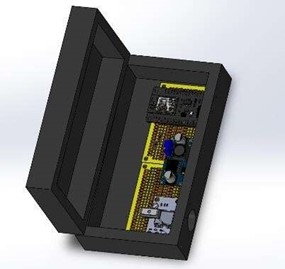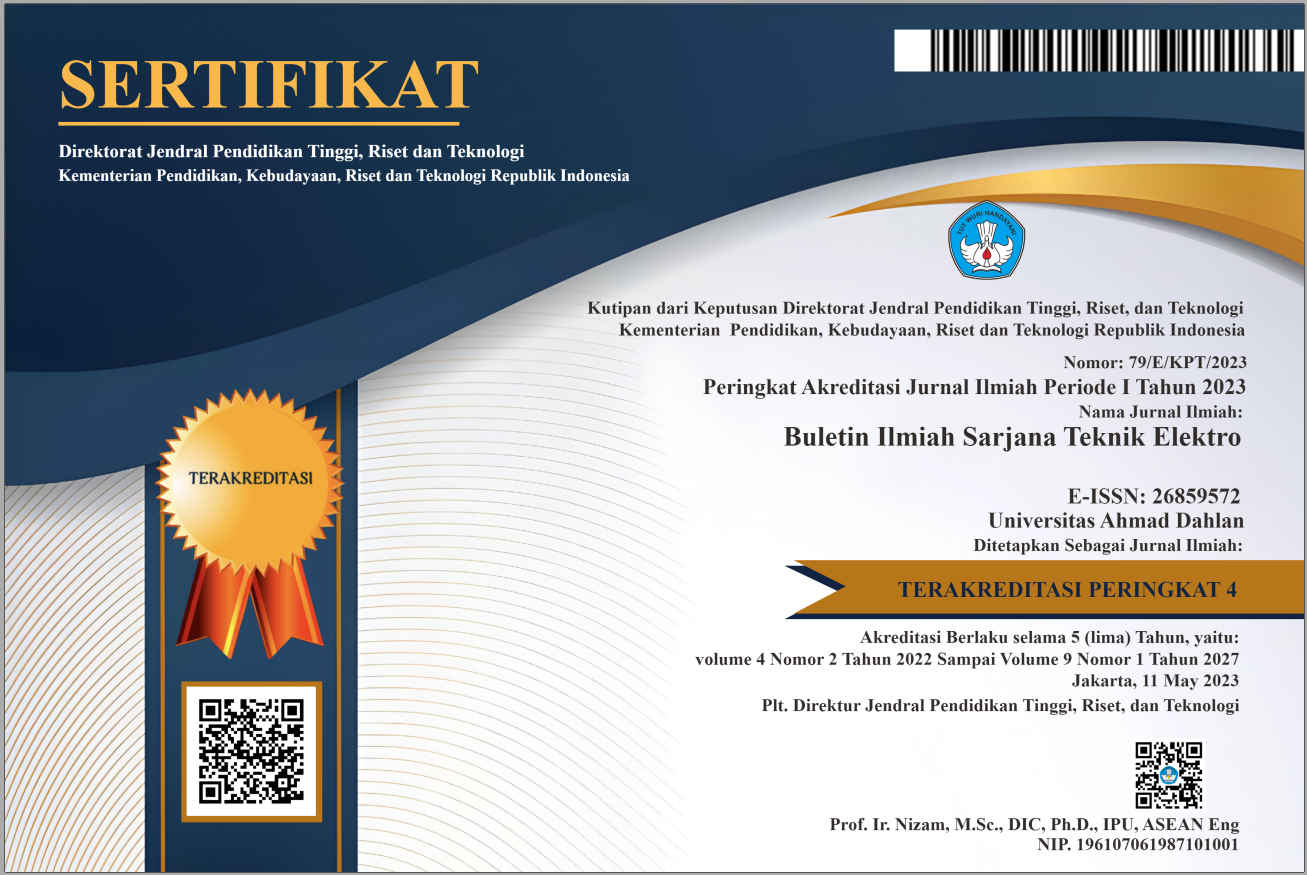EM-IOT: IoT-Based Battery Monitoring System and Location Tracking on Electric Vehicles
DOI:
https://doi.org/10.12928/biste.v5i2.8053Keywords:
Electric Vehicle, Monitoring, Battery, Latitude, LongitudeAbstract
As the community increasingly embraces electric vehicles over time, there is a growing necessity for electric vehicle users to determine the real-time status of their batteries and their locations. This enables them to estimate when and where their electric vehicle batteries will need to be recharged. The battery condition can be used to estimate the remaining distance that the electric vehicle can travel while monitoring and observing the location of the electric vehicle is required for security and can also be used as a suggestion for electric vehicle users to carry out charging by adding information on the location of the nearest charging station. The EM-IOT system is designed to be accessible via an Android smartphone with an easy-to-understand and attractive user interface. The wireless system is designed with the ES12E module and the Thingspeak platform. Testing is done to ensure the system can work properly. The test results of battery monitoring and location tracking on the EM-IOT application have been able to display data with an average error not exceeding 5%. The data on the application is updated every 15 seconds. The EM-IOT system can function properly to monitor battery voltage, battery percentage, remaining distance, and the current location of the system vehicle.
References
P. Lyu, P. S. Wang, Y. Liu, and Y. Wang, “Review of the Studies on Emission Evaluation Approaches for Operating Vehicles,” Journal of Traffic and Transportation Engineering (English Edition), vol. 8, no. 4, pp. 493–509, 2021, https://doi.org/10.1016/j.jtte.2021.07.004.
E. Agamloh, A. von Jouanne, and A. Yokochi, “An Overview of Electric Machine Trends in Modern Electric Vehicles,” Machines, vol. 8, no. 2, p. 20, 2020, https://doi.org/10.3390/machines8020020.
A. Ghosh, “Electric Vehicles—Solution Toward Zero Emission from the Transport Sector,” World Electric Vehicle Journal, vol. 12, no. 4, p. 262, 2021, https://doi.org/10.3390/wevj12040262.
M. F. N. Maghfiroh, A. H. Pandyaswargo, and H. Onoda, “Current Readiness Status of Electric Vehicles in Indonesia: Multistakeholder Perceptions,” Sustainability (Switzerland), vol. 13, no. 23, p. 13177, 2021, https://doi.org/10.3390/su132313177.
M. S. Hossain, L. Kumar, M. M. Islam, and J. Selvaraj, “A Comprehensive Review on the Integration of Electric Vehicles for Sustainable Development,” Journal of Advanced Transportation, vol. 2022, 2022, https://doi.org/10.1155/2022/3868388.
M. Muratori et al., “The rise of electric vehicles-2020 status and future expectations,” Progress in Energy, vol. 3, no. 2, 2021, https://doi.org/10.1088/2516-1083/abe0ad.
D. A. Asfani et al., “Electric Vehicle Research in Indonesia: A Road map, Road tests, and Research Challenges,” in IEEE Electrification Magazine, vol. 8, no. 2, pp. 44-51, June 2020, https://doi.org/10.1109/MELE.2020.2985485.
B. O. Varga, A. Sagoian, and F. Mariasiu, “Prediction of electric vehicle range: A comprehensive review of current issues and challenges,” Energies, vol. 12, no. 5, 2019, https://doi.org/10.3390/en12050946.
Z. S. Shamma, B. Jones, M. Clark, C. Bailey, and M. Harper, “Electric vehicle range prediction estimator (EVPRE),” Software Impacts, vol. 13, p. 100369, Aug. 2022, https://doi.org/10.1016/j.simpa.2022.100369.
K. S. Phadtare, S. S. Wadkar, S. S. Thorat, A. S. Ghorpade, and M. A. B. Jadav, “A Review on IoT based Electric Vehicle Charging and Parking System” Int. J. Eng. Res, vol. 9, no. 8, pp. 831-835, 2020, https://doi.org/10.17577/IJERTV9IS080361.
S. Soma, S. Bergonda, G. Shruti, and B. Sushmita, “IoT based vehicle accident detection and tracking system using GPS modem,” International Journal of Innovative Science and Research Technology, vol. 2, no. 4, pp. 261-26, 2017, https://www.ijisrt.com/iot-based-vehicle-accident-detection-and-tracking-system-using-gps-modem.
L. Fei, M. Shahzad, F. Abbas, H. A. Muqeet, M. M. Hussain, and L. Bin, “Optimal Energy Management System of IoT-Enabled Large Building Considering Electric Vehicle Scheduling, Distributed Resources, and Demand Response Schemes,” Sensors, vol. 22, no. 19, p. 7448, 2022, https://doi.org/10.3390/s22197448.
N. N. Pham, J. Leuchter, K. L. Pham, and Q. H. Dong, “Battery Management System for Unmanned Electric Vehicles with CAN BUS and Internet of Things,” Vehicles, vol. 4, no. 3, pp. 639-662, 2022, https://doi.org/10.3390/vehicles4030037.
S. Krishnakumar et al., “IoT-based Battery Management System for E-Vehicles,” 2022 3rd International Conference on Smart Electronics and Communication (ICOSEC), 2022, pp. 428-434, 2022, https://doi.org/10.1109/ICOSEC54921.2022.9952052.
M. H. A, Wahab et al., “IoT-Based Battery Monitoring System for Electric Vehicle Development of the Photovoltaic (PV) Module Using Artificial Neural Network (ANN) View project IoT-Based Battery Monitoring System for Electric Vehicle,” in International Journal of Engineering & Technology, vol. 7, pp. 505–510, 2018, https://www.sciencepubco.com/index.php/ijet/article/view/25472.
M. H. Qahtan, E. A. Mohammed, and A. J. Ali, “IoT-Based Electrical Vehicle’s Energy Management and Monitoring System,” Open Access Library Journal, vol. 9, no. 7, pp. 1–15, 2022, https://doi.org/10.4236/oalib.1109072.
A. Vekhande and A. Maske, “Iot-Based Battery Parameter Monitoring System for Electric Vehicle,” International Journal of Creative Research Thoughts – IJCRT, vol. 8, no. 7, pp. 3145-3151, 2020, https://www.ijcrt.org/viewfull.php?&p_id=IJCRT2007312.
S. Aisyah, A. F. Daulay, H. Wijanarko, D. S. Pamungkas, and K. Kamarudin, “IoT-Based Tracking System of Transceiver Location,” Jurnal Rekayasa Elektrika, vol. 17, no. 4, Dec. 2021, https://doi.org/10.17529/jre.v17i4.22347.
M. H. Qahtan, E. A. Mohammed, and A. J. Ali, “Charging Station of Electric Vehicle Based on IoT: A Review,” Open Access Library Journal, vol. 9, no. 6, pp. 1–22, 2022, https://doi.org/10.4236/oalib.1108791.
G. F. Savari, V. Krishnasamy, J. Sathik, Z. M. Ali, and S. H. A. Aleem, “Internet of Things based real-time electric vehicle load forecasting and charging station recommendation,” ISA transactions, vol. 97, pp. 431-447, 2020, https://doi.org/10.1016/j.isatra.2019.08.011.
E. A. Mohammed, M. H. Qahtan, and A. J. Ali, “Internet of things based real-time electric vehicle and charging stations monitoring system,” Indonesian Journal of Electrical Engineering and Computer Science, vol. 27, no. 3, pp. 1661–1669, Sep. 2022, doi: https://doi.org/10.11591/ijeecs.v27.i3.pp1661-1669.

Published
How to Cite
Issue
Section
License
Copyright (c) 2023 Tasya Thifali Salsabila, Haikal Faiz Ramadhan , Iftitah Imawati, Dwi Ana Ratna Wati

This work is licensed under a Creative Commons Attribution-ShareAlike 4.0 International License.
Authors who publish with this journal agree to the following terms:
- Authors retain copyright and grant the journal right of first publication with the work simultaneously licensed under a Creative Commons Attribution License that allows others to share the work with an acknowledgment of the work's authorship and initial publication in this journal.
- Authors are able to enter into separate, additional contractual arrangements for the non-exclusive distribution of the journal's published version of the work (e.g., post it to an institutional repository or publish it in a book), with an acknowledgment of its initial publication in this journal.
- Authors are permitted and encouraged to post their work online (e.g., in institutional repositories or on their website) prior to and during the submission process, as it can lead to productive exchanges, as well as earlier and greater citation of published work (See The Effect of Open Access).
This journal is licensed under a Creative Commons Attribution-ShareAlike 4.0 International License.


